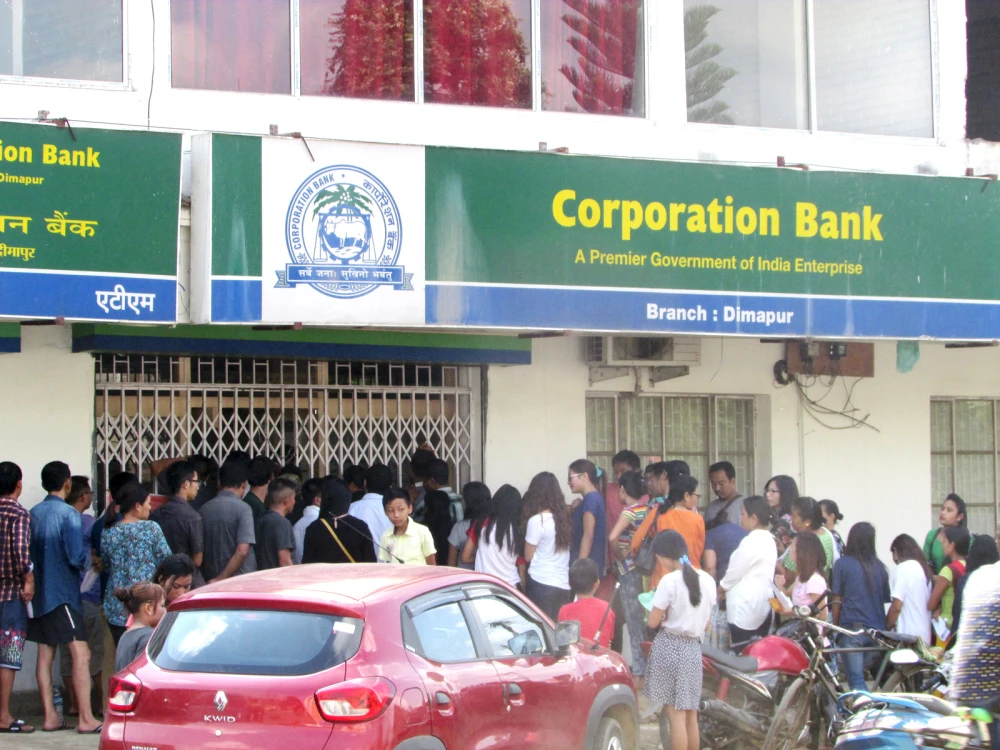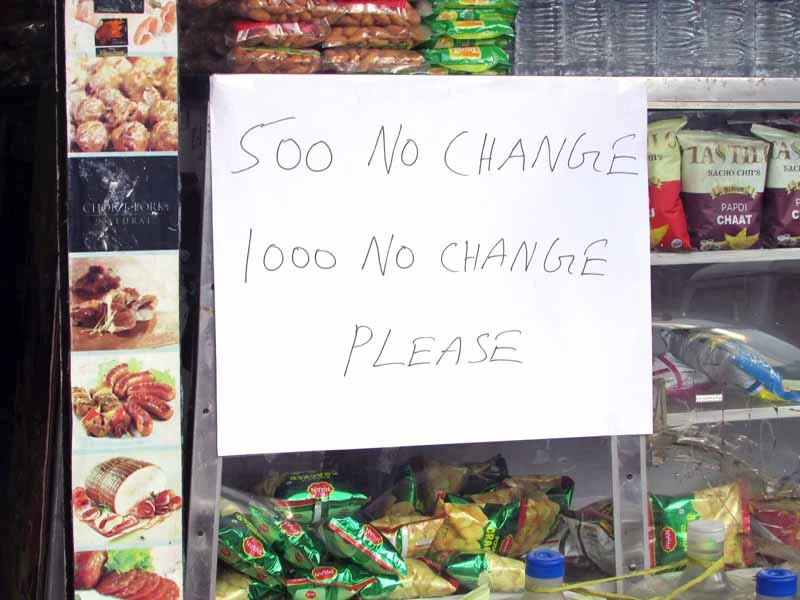People queue up in front of banks in Dimapur to deposit devalued currencies and withdraw new valued ones on Saturday. A notice displayed in a shop saying it has no change for Rs 500 and Rs 1000 notes. (Morung Photo)
Rs 2000 more of a burden on debut
Morung Express News
Dimapur | November 12
As the demonetisation process continued for the fourth day, people were confronted with a new problem – spending their crisp new Rs 2000 notes as the avenue were limited.
Saturday witnessed more chaos and even longer queues at the bank and the ATMs. Cash starved people including elderly and women lined up in serpentine queues to withdraw valid currency notes to meet their daily expenses.
Branches of State Bank of India saw the most crowds. The queues spread to the streets and the police were put on duty to manage the crowd.
“I have been standing for the past two hours but still haven’t even reached halfway, a youth standing outside the SBI main Branch Dimapur lamented.
A lone SBI ATM in the vicinity was also dispensing only 2000 notes. At SBI Dhobinalla Branch, another customer who was standing in queue since early morning pointed to a security barricade, and wistfully said it would take another half an hour to reach the counter.
Traders also continued to bear the brunt of demonetization. Business has been ‘thanda’ (cool) for last two days, a shopkeeper who had lined up outside Corporation Bank Dimapur commented, adding that most of his stocks were given out on credit and he needed the new notes since the wholesalers were not accepting the old 500 and 1000 notes.

In Dimapur, most of the shops had put up sign outside with a note saying “Sorry, no Rs.500 or 1000 notes.” Many shops, hotels and eateries turned away customers for the want of change. Even the multinational food chains were only accepting either lower notes or debit cards.
When a Corporation Bank ATM opened in the evening, people jostled to get to the booth as it was dispensing crisp new Rs 100 notes.
Instead of coming to the rescue, the newly introduced Rs 2000 notes have only been adding to the woes of the common people. With crisis of Rs 100 notes, traders and customers alike are at loss to get loose change of such a huge amount.
Limasungit Jamir, a resident of Mokokchung town who managed to withdraw some amount said, “I went to market with the new 2000 currency and the shopkeeper was shocked saying “kokai kojera keneka tibo” (How can I give change for that).

“I do agree with our PM’s objective but introducing the 2000 note earlier is creating a problem for common people like me. The government should have introduced the new 500 currency instead,” Jamir pointed out.
Branch Manager of Corporation Bank at Duncan Bosti said it would take around two weeks for things to return to normal-that is if cash are available.
“If it is not an emergency, people should withdraw money only to meet their current needs so that cash are available for everyone,” he suggested.
“The problem of the cash crunch is that it runs out quickly due to growing demand. Besides, with banks accepting exchange for those not having an account, every day the cash bought from our ‘currency chest’ runs out by afternoon,” the Branch Manager stated.
However, he said there was no reason to panic while assuring that, “Normalcy will return within a few weeks time.”
Anger grows in India as banks struggle to swap banned notes
NEW DELHI, NOVEMBER 12 (REUTERS): Anger rose across India on Saturday as banks struggled to dispense cash after the government withdrew large denomination notes in a shock move aimed at uncovering billions of dollars of unaccounted wealth hidden from the taxman.
Hundreds of thousands of people stood outside banks for a third day for long hours trying to replace 500 and 1,000-rupee bank notes that were abolished earlier in the week. These bills made up more than 80 percent of the currency in circulation, leaving millions of people without cash and threatening to grind large parts of the cash-driven economy to a halt.
“There is chaos everywhere,” said Delhi Chief Minister Arvind Kejriwal and a bitter foe of Prime Minister Narendra Modi. He said Modi’s move had upended the lives of the poor and working while the rich - whose wealth he had sought to target - had found loopholes to get around the new rules. People argued and banged the glass doors of a branch of Standard Chartered bank in southern Delhi after the security guards blocked entry, saying there were already too many people inside the bank.
Others turned on Modi, criticising his ongoing visit to Japan while countrymen suffered at home. “He is taking bullet train rides in Japan and here you have old people knocking on bank doors for cash,” said Prabhat Kumar, a college student who said he had spent six hours at the queue. “He has made a terrible mistake.”
But Modi said he would pursue the war against corruption and tax defaulters even if it meant going back decades to examine records. “If unaccounted money is found out during the current clean up drive, accounts of tax evaders dating back to the country’s independence in 1947 will be checked, Modi said in a speech to the Indian community in Kobe.
He said he recognised people faced difficulties as the transition to the new series of bank notes takes place but he was confident they would stand by the decision as part of the war on corruption and to rid India of endemic poverty.
Exemption extended till Nov 14
With people facing difficulties due to the demonetisation move, the government has extended the use of old Rs 500 and Rs 1,000 notes till November 14, in railway ticket booking counters, ticket counters of government buses and airline ticket counters at airports.
The high denomination notes will also be legal tender in petrol, diesel and CNG gas stations authorised by public sector oil companies, consumer co-operative stores authorised by state or central government.






